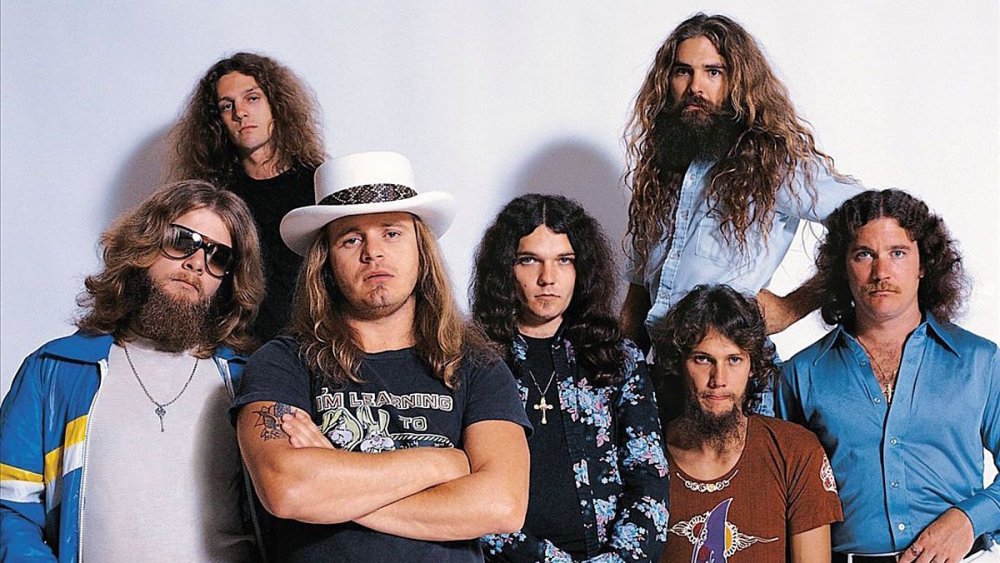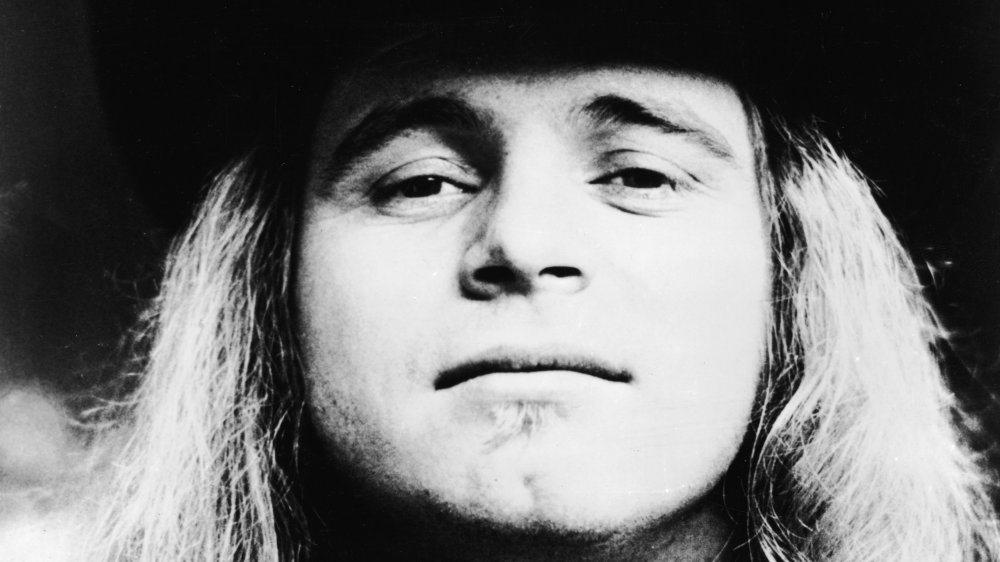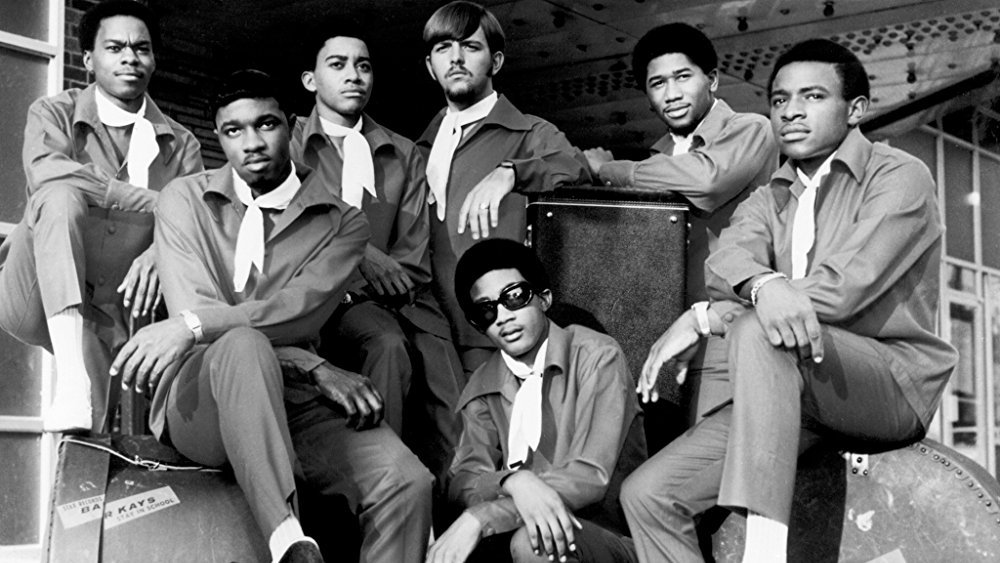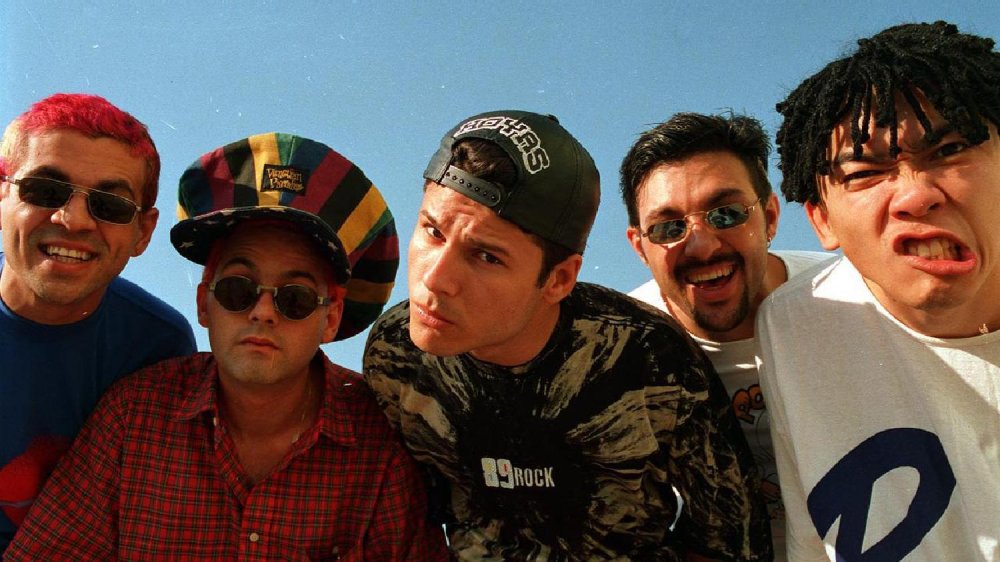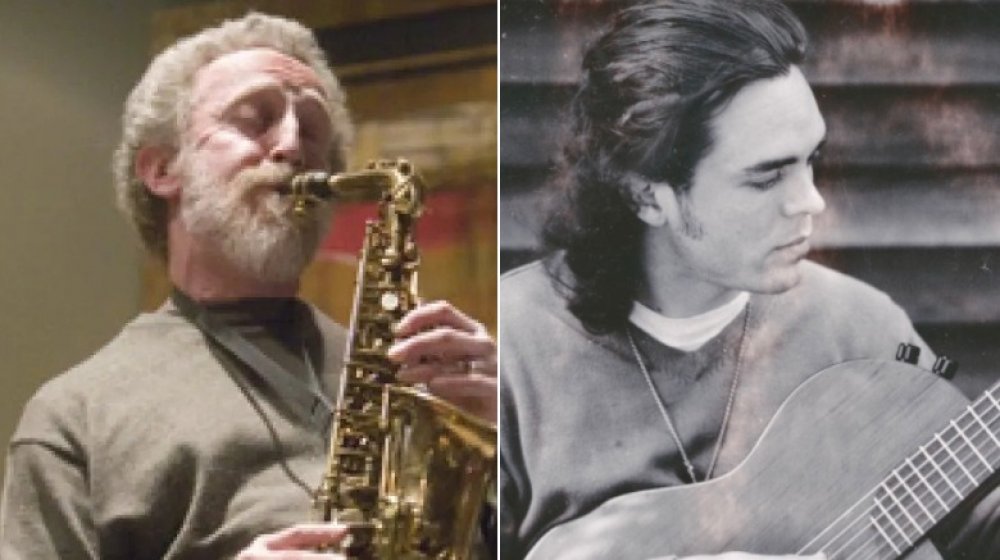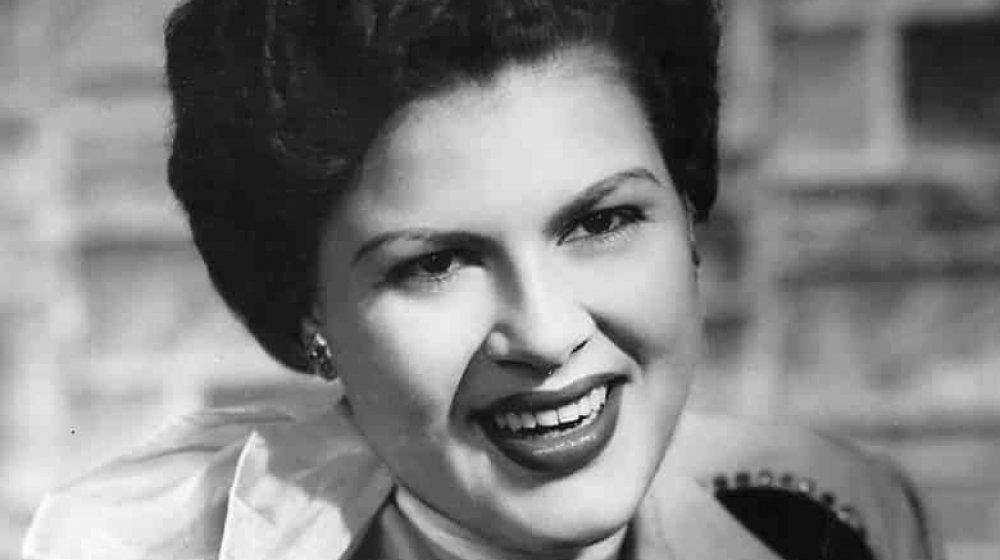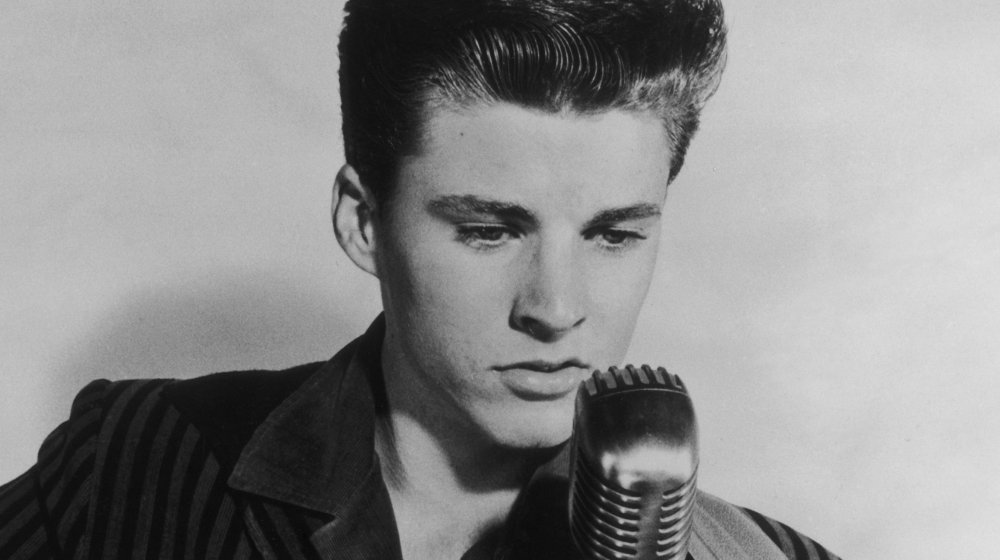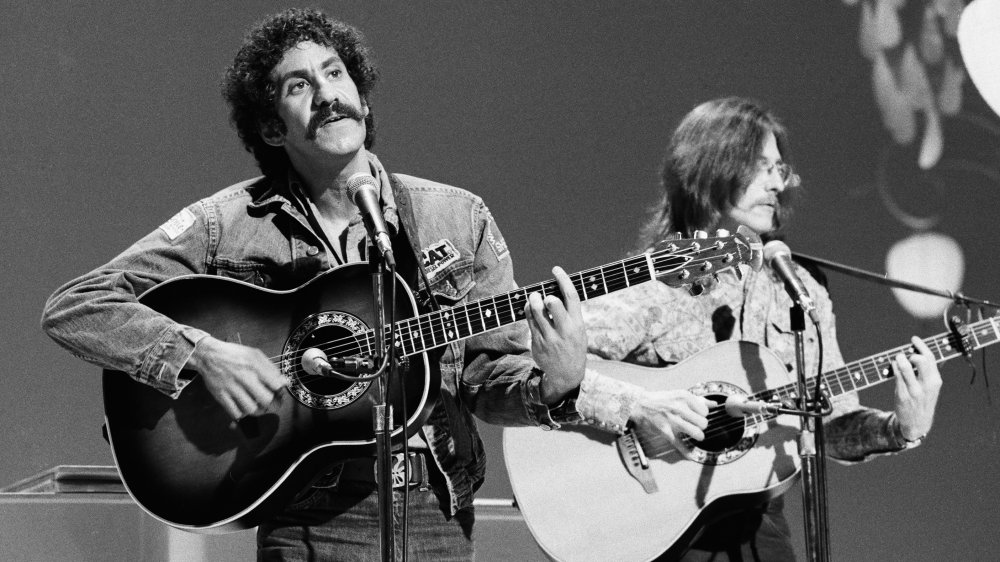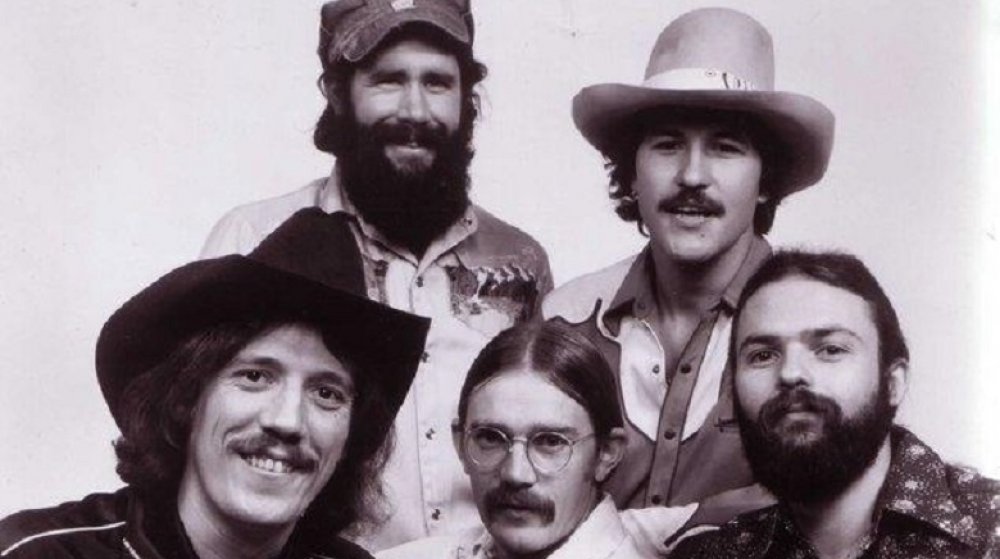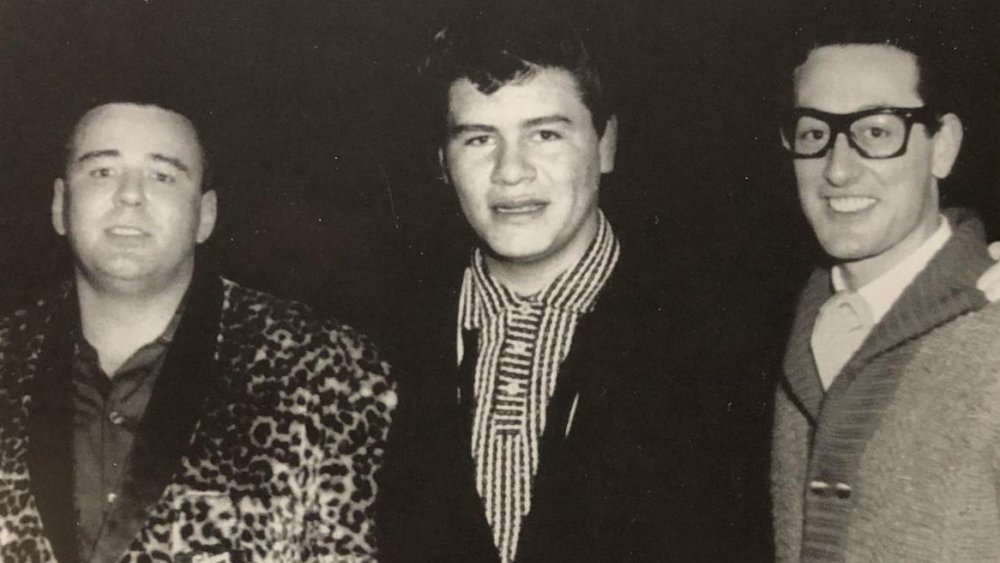Plane Crashes That Nearly Wiped Out Entire Bands
Rock 'n roll generally isn't the business to be in if you want to live forever. For evidence, consider the Queen song "Who Wants to Live Forever," plus the fact that a shocking number of musicians die young, or at least not old. Sometimes it seems like even the ones who don't decide to check out at 27 leave us before they become what we would consider to be "elderly;" look at David Bowie (whose liver betrayed him), or Warren Zevon (who didn't see a doctor for 20 years), or Prince (who kind of just music-ed himself to death).
The rigors of the road can take a toll on even the hardiest soul, and sometimes, the road itself can snatch amazing talents away from us. Well, the air, really, for our purposes here. Traveling by plane can be hazardous, is what we're saying. (See what we did there? Great, because we don't.) The list of music luminaries who have died in plane crashes includes some true icons — Stevie Ray Vaughn, Aaliyah, and John Denver pop to mind — but it also includes a jaw-dropping number of partial or entire bands who have been wiped out by bad weather, pilot error, or simply cruel fate.
Definitive Southern rock band devastated
In 1977, the phonetically-challenged band Lynyrd Skynyrd were riding high on the release of their fifth album Street Survivors as they departed on what was to be their biggest tour to date. Rather than busing it all over the nation, though, the band had chosen to charter a private plane: a Convair CV-240 operating out of Texas. This plane had previously been considered for this same use by Aerosmith, who had personally checked it out, but passed due to the fact that they had a bad feeling about the crew. If they had made a different decision, we'd probably be writing about them (via History).
On October 20, 1977, Lynyrd Skynyrd's plane simply ran out of gas on its approach to Baton Rouge, Louisiana. The pilots (who would posthumously shoulder the blame for the crash) made a panicky request for an alternate landing site to Houston air traffic control roughly 13 minutes before going down in a wooded area outside Gillsburg, Mississippi. Although 20 people survived the crash, it claimed the lives of lead singer Ronnie Van Zant, guitarist Steve Gaines, and his sister and backup singe Cassie Gaines. Although the band would eventually soldier on with Ronnie's brother Johnny taking over lead vocals, they wouldn't release another album until 1991, and they never again achieved the stratospheric levels of success they did before fate (and two terrible pilots) intervened.
Queen of country loses her entire court
Reba McEntire has had one heck of an enviable career, comprising over four decades and nearly three dozen albums. She's one of the great stalwarts of country music, having put out hit record after hit record without ever changing up her traditionally-influenced vocal style; she's also appeared in a ton of movies and TV shows, including her own eponymous sitcom, which ran for six seasons between 2001 and 2007. Her astonishing track record of success is made all the more so for the fact that smack dab in the middle of it all, a plane crash claimed eight of the 10 members of her backing band (via Biography).
The star herself was supposed to have been on the plane, but remained behind in Saginaw, Michigan, after the night's gig due to a touch of bronchitis. A combination of the pilots' unfamiliarity with the area and the boneheaded instructions an air traffic controller (who told them that it was just fine to buzz a nearby mountain at under 3,000 feet) resulted in the plane clipping an outcropping with its wing, sending it tumbling into the rocky terrain, where it exploded in a ball of fire. McEntire, of course, recovered professionally — but one never quite recovers personally from such a loss. Discussing the tragedy with Oprah Winfrey over 20 years later, the "Queen of Country" broke down, saying, "I don't guess it ever quits hurting."
End of the line for way too many R&B legends
Otis Redding was an absolute legend; his voice could make you dinner, give you some sweet romance, rock your infant child to sleep, and do the dishes (it's no wonder his records sold so well). Memphis band the Bar-Kays were approaching that status as well, and their 1967 tour with Redding was helping to cement it; one of their two surviving members, James Alexander (ominous foreshadowing) called it "an amazing thing" just to be mentioned in the same breath with him (via WREG Memphis). Redding and the Bar-Kays played over a hundred shows together that year — one that should've ended in triumph, but instead ended in tragedy when their small plane, carrying Redding and every Bar-Kay except Alexander, crashed into a Wisconsin lake.
Alexander rushed to the scene to be greeted by his shell-shocked bandmate Ben Cauley, the only survivor of the crash. Redding had just finished recording a rough version of what was to be his breakout crossover tune, which instead became the first posthumous #1 pop hit in history: "(Sittin' On) The Dock of the Bay," which, despite being a first draft, is about as close to a perfect song as you can get (via Best Classic Bands). Cauley passed away in 2015; Alexander is still around, and he's the father of R&B producer Jazze Pha, whom he named after his bandmate Phalon Jones.
Brazil's best lost too soon
Brazil has always had a pretty ginormous rock scene, and in the mid-'90s, no band was quite as hot (literally and figuratively; this is Brazil we're talking about) as Mamonas Assassinas. The band were as funny as they were hard-rocking (one possible English translation of their name is "Killer Big Breasts"), and their 1992 debut album had sold nearly 2 million units despite the fact that they were virtually unknown outside of their home country. Their rise to fame was nothing short of meteoric, and their entire country was pitched into mourning when, in March 1996, their chartered plane slammed into a mountainside as their pilot was attempting a second approach to São Paulo–Guarulhos International Airport.
An Associated Press report at the time stated that after the band's bodies were brought to the morgue, such an avalanche of fans descended upon the place that troops had to be sent in to restore order. The city council in the Mamonas' hometown of Guarulhos organized an all-night vigil, thousands of fans showed up; they were well-regarded, is what we're saying. They're still legends in Brazil today, and it's a bummer to think that pilot error likely robbed the entire world of decades of hilarious rocking.
Two-thirds of girl group, gone
In the months after 9/11, any mishap involving a plane was grounds for freaking out. The crash of Crossair Flight 3597 was one such incident; en route to Zurich from Berlin in November 2001, the plane encountered violent weather, and went down in the woods. Contemporary news reports were quick to point out that no terrorism was suspected (unless thunderstorms count); of the 33 people on board, 24 died (via CNN). Somewhat lost in the shuffle was the fact that among the dead were up-and-coming singer Melanie Thornton, and two of the three members of the Dutch-German dance pop outfit Passion Fruit.
The group, active since 1999, had scored hits in Germany with fun titles like "The Rigga-Ding-Dong-Song," "Sun Fun Baby," and "Bongo Man"; sure, they may not have been the Beatles, but their fans loved them. Particularly shocking was the fact that it was Crossair's second fatal crash in only two years, and the airline ceased operations only a few months later (via Chicago Tribune). The cause of the crash was found to be pilot error, which you may recognize as a recurring theme here.
A jazz legend loses key supporting players
In 2009, a commuter plane operated by small regional carrier Colgan Air experienced a mid-air stall; shortly afterward, it experienced a serious case of its pilots freaking out and reacting as if they'd never flown a plane before, according to the NTSB experts who would later examine the cause of the crash (via NPR). Because of this — specifically, because the pilot pulled back instead of pushing forward on a control column, three separate times — the plane then experienced crashing into a freakin' house.
Among the 49 who died were Gerry Niewood and Coleman Mellett — the saxophonist and guitarist, respectively, for Chuck Mangione's band. (If you're not sure who Mangione is, you've never listened to smooth '70s jazz or watched King of the Hill.) Mangione called the crash a "horrible, heartbreaking tragedy," and it prompted a strenuous reevaluation of Colgan Air's training protocols. This didn't seem to help, however; about a year and a half later, a Colgan flight en route to Lake Charles, Louisiana landed at the wrong airport (via Fox News), causing the FAA to give the small airline a hard, disapproving stare. Colgan ceased operations less than a year later.
A country icon's time to go
Patsy Cline became a country music legend before even turning 30, but fate kind of seemed to have it in for her, and she seemed determined to tempt it. At 28, she was involved in a serious car crash — her second — which required months in the hospital and major facial reconstructive surgery to recover from, but that only slowed her down temporarily. She spent the next couple years flying all over the place, country-ing it up fellow artists Cowboy Copas and Hawkshaw Hawkins, who had perhaps the two coolest names we've ever heard.
A week before the plane crash that took the lives of all three, she was reported to have told a friend, "Honey, I've had two bad ones. The third one will either be a charm or it'll kill me" (via City Pages). The third one came after performing a benefit concert in Kansas City; fellow songstress Dottie West had a bad feeling about Cline flying, and offered her a seat in her car for the return trip to Nashville. Cline, anxious to get home to her family, replied, "Don't worry about me, Hoss. When it's my time to go, it's my time."
Unfortunately, it was her time. Once again, the inexperience of her small plane's pilot (her manager, Randy Hughes) proved to be the determining factor in the crash; unbelievably, fellow country artist Jack Anglin paid grim tribute by dying in a car crash on the way to Cline's funeral.
A comeback cut cruelly short
Ricky Nelson was Justin Timberlake before Justin Timberlake was Justin Timberlake. He didn't just have an enviable career; he had several, and seemingly transitioned easily between them. He began his showbiz career as a child star on the classic sitcom The Adventures of Ozzie and Harriet, the stars of which were his real life parents. At 16, he made his first album, and at 17, he scored his first #1 single. At 19, he appeared in the classic Western Rio Bravo, kicking off a long film and television career in his own right; the guy had pretty much conquered the world while still a teenager, so when he embarked on a comeback tour in his 40s, nobody had any reason to think he couldn't do it again.
But on New Years' Eve 1985, Nelson met the only thing that ever slowed him down, let alone stopped him: an old Douglas DC-3 propeller plane with a history of mechanical problems. He and his Stone Canyon Band had spent the better part of the year touring with Fats Domino (who was not on board the plane), and they were on their way to Dallas for another concert when disaster struck (via Associated Press). The plane simply burst into flames in mid-flight, crashing into a pasture in Texas and killing everyone aboard except the pilots, including Nelson, his entire band, their sound guy, and Nelson's fiancee, Helen Blair. If you know any fans of rockabilly, ask them about Nelson sometime if you've got several hours to kill.
Fate messes around with Jim
Jim Croce struggled for years to finally make it in the music world. He wrote his first hit song, "You Don't Mess Around With Jim," in the cab of the truck he was driving to make ends meet. The New York coffee house circuit was where he finally found an audience receptive to his sound, which was partially shaped by his friend and guitarist, Maury Muehleisen.
His fourth album Life and Times gave him his first #1 hit — a tune you may have heard by the name of "Bad, Bad Leroy Brown" — and for a couple years, the singer-songwriter was finally getting his due. He had just completed work on his fifth album I Got a Name when, on October 20, 1973, he and Muehleisen along with three others were killed as their tiny, single-engine plane struck a tree while attempting to take off (via Rolling Stone). Croce left behind not only his burgeoning career, but his wife Ingrid and two-year old son A.J. There aren't many better examples of a life on a serious upswing cut short by senseless tragedy. Ingrid went on to become a successful restaurateur, while A.J. followed in his dad's footsteps to become a respected singer-songwriter who carries his name with him, like his daddy did.
The Big Sky state's namesake band meets a tragic end
The worst private plane crash in the history of Montana took the lives of every single member of a band of the same name, a country-western outfit which formed from the ashes of the defunct Mission Mountain Wood Band. The hard-traveling band had been on their way to Idaho for a concert on the Fourth of July, 1987; not long after takeoff, their plane slammed into a wooded hillside, killing all six band members, one musician's son, their manager, the plane's pilot, and his girlfriend (via Chicago Tribune).
While the band had never gained national notoriety, they had been very popular regionally, and after the tragedy, the members of Mission Mountain who had departed the band years earlier reformed Montana. Proving that you can't keep a good band down, the revamped Montana proceeded to tour and perform for adoring fans for the next 30-plus years (via Billings Gazette). Ironically, the original band had been known for cruising the countryside in their oft-broken-down 1955 Greyhound Scenicruiser bus; in 2014, the members of the new Montana tracked the bus down to the backyard of some guy in Missoula, and one of them bought the old thing, whipped it into roadworthy shape, and drove it home, presumably with his old bandmates smiling down on him.
The Day the Music Died
You may have heard of the "Day the Music Died," February 3, 1959. On that day, a small plane went down in bad weather, taking with it three absolute trailblazers of rock 'n roll: J.P. "The Big Bopper" Richardson, one of the first rockabilly stars; Ritchie Valens, the first Latino rock star; and Buddy Holly, whose mighty influence on the budding genre would continue to be felt for literally decades (via History). The three had been on tour together spreading the good word of rock throughout the land, and the crash that claimed their lives destroyed the innocence of teeny-boppers far and wide.
The plane had been chartered by Holly for himself and his band alone; Valens and Richardson, suffering from a touch of the flu, had actually talked their way onto the doomed craft (via Rolling Stone). Valens persuaded guitarist Tommy Allsup to give up his seat, and Richardson asked the same of bassist Waylon Jennings, whom you may know went on to have a country-western career of some note. Jennings told Holly that he would just go ahead and take the bus to their next tour stop, to which Holly jokingly replied that he hoped the bus would break down. Jennings retort: "I hope your ol' plane crashes."
Of course, Jennings went on to become the leather-wearing, bad boy outlaw of country — because if you had inadvertently cursed one of the greatest musicians of all time, you'd break bad, too.
